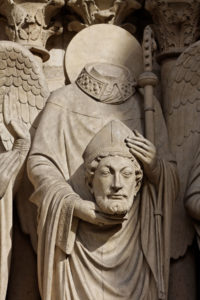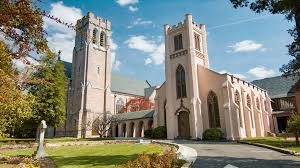Note: This sermon was delivered on my first Sunday as the Associate Rector at The Chapel of the Cross, Chapel Hill, NC.
The Rev. Noah Van Niel
The Chapel of the Cross, Chapel Hill, NC
November 4, 2018
All Saints’ Day: Isaiah 25:6-9; Psalm 24; Revelation 21:1-6a; John 11:32-44
Good morning! How are y’all doing today? (Did I pronounce that right—“y’all”? I’ve been practicing). It is a joy to finally be with you. Thank you for your patience and for what has already been a warm welcome for me, my wife Melinda and my sons Vincent and Arthur to this magnificent church and this beautiful community. Thank you. We are very excited to settle in here and I am very excited to work with you and your wise, faithful leader, Mother Elizabeth Marie and the rest of the team here. And over the coming years I look forward to spending much time worshiping with you, learning from you, and offering myself to the building up of Christ’s kingdom in this place and in this world, a world that so desperately needs his reconciling and life-giving love. It is an honor to have been called here and I can’t wait to get started.
But before we jump in I want to say that I am aware of what a season of farewells it has been for you these past couple months, and these past couple years for that matter. You have been in my prayers as you have bid numerous goodbyes to people and pastors who have served you faithfully and lovingly for such a long time. From what I know, you have been served by some incredible priests and lay people who led with love and manifested God’s presence to many of you. I am grateful to them for having established such a faithful foundation in this place because I believe it has set the Chapel of the Cross up for an exciting, and glorious future. I am looking forward to walking with you into that future, feeling, sensing, following, where the Spirit that dwells so richly in this place is calling us to go. “Behold, I am making all things new,” we heard this morning. What new thing is about to break forth in this place? What new thing is waiting to burst forth from your heart? These are questions I am eager to answer alongside you.
One good thing about all these farewells you have been saying lately though, is that it means lots of practice throwing parties. Which is good because today, All Saints’ Day, may be the pinnacle party day. Parades of saints, baptisms, great music, maybe even some cake and leftover candy, All Saints’ Sunday, is one of my favorite days in the Church year and y’all are doing it right!
But as I was preparing for this festive day, I must confess that I was left wondering, for all the pageantry and celebration of All Saints’ Day—really, when you think about it, what good is a Saint? I don’t mean to slight them on their special day, but beyond their interesting stories and the beautiful artwork many of them inspired, what good for me, for you, for Christians living in the 21st century, is a Saint?
Because on the one hand you have to admit their veneration has some troubling aspects. First of all, as you will know if you’ve been reading the emails of this past week, in the New Testament all faithful Christians were referred to as “saints.” The separation of “Saints” with a capital S—the distinguishing of certain holy people as especially worthy of veneration, or who could bend the ear of God on our behalf after their death—was not exactly scriptural, it was an invention of the Church as it evolved over time. It wasn’t necessarily a bad evolution in the Church’s life, but it was an evolution all the same. And one path that led down was the tradition of “Patron Saints” which may be more familiar to those of you with a Roman Catholic background. The idea is that certain Saints are assigned certain things that they are in charge of; as if Heaven had a highly complicated org chart with the Godhead at the top and all the Saints functioning as middle management. These patronages can be fun—there’s literally a saint for almost anything you could think of—but they also skirt the edges of polytheism which makes me a little uncomfortable.
And then there are the suspicious stories that have evolved around some of these holy men and holy women. These hagiographies, as they are called, can stretch the credulity of even the staunchest of believers.  One of my favorites is St. Denis, the renowned 3rd century preacher who was so committed to spreading the Gospel of Christ that, it is said, even after he was decapitated, he walked for miles, head—literally—in hands, preaching all the way. I believe God can do some amazing things, but that story is a little hard for me to swallow. But, what do I know, for despite the dubious biography, beloved St. Denis, became the patron saint for all of France, and, not ironically, headaches.
One of my favorites is St. Denis, the renowned 3rd century preacher who was so committed to spreading the Gospel of Christ that, it is said, even after he was decapitated, he walked for miles, head—literally—in hands, preaching all the way. I believe God can do some amazing things, but that story is a little hard for me to swallow. But, what do I know, for despite the dubious biography, beloved St. Denis, became the patron saint for all of France, and, not ironically, headaches.
So, given all these complicating aspects surrounding our beloved Saints, I ask again—what good is a saint?
Our second lesson this morning comes from the book of Revelation, a wild, awe-filled book written by one of the many St. John’s we have in our calendar—St. John the Divine. And in this reading, John describes to us his vision of the day when the divide between Heaven and Earth will melt away and God will come, in completeness, to be with us, to dwell among us. And when that happens, when that heavenly city comes to fruition it will be so joyous, and so beautiful that tears of sorrow will evaporate, mourning and crying and pain will pass away and that kingdom, that magnificent, hoped for Kingdom of love and peace for all the peoples will finally come to reign.
Saints are those who have caught that vision and never recovered. For a Saint, rather than some holier than thou ancient character with dubious biographical credentials and magical powers, is above all a human being who caught a glimpse of what this world could be with God at the center of it and could never be the same. They are people who are so consumed by the potency of this promised possibility for a world of love and justice, peace and joy, that the rest of their lives were devoted to sharing that vision with others, and making it a reality. Saints are those people who glimpsed the glory God has in store for us, and who were so incontrovertibly changed by it that they ended up changing the world.
When have you glimpsed the glorious presence of God in your life, and what difference has it made? Because if God has, at any point in your life, drawn back the curtain, like he did for St. John the Divine, and showed you a vision of what the world could be like with him at the center of it, and not on the periphery, then you have been given all the makings of sainthood. Yes, you. For, after all, there is no saintly gene; they come in all shapes and sizes. Like champions saints are made, not born. And you, each of you, has what it takes to become one.
How do I know you have the makings of a saint without even having even met most of you? Baptism. For in your baptism you have been granted the assurance, in no uncertain terms, that your fundamental identity is beloved child of God and you are marked as Christ’s own forever. And we can do all things through Christ, who strengthens us; even become a saint. And the baptismal service goes even further in setting us up for sainthood because it doesn’t just establish our identity as beloved child of God, it then goes on to ask us—ALL of us—“given that, what are you going to do with it? What difference is being a disciple of Christ going to make in your life?” Which is why we have our baptismal covenant. Those words are a sainthood schematic. It outlines visible, active ways in which we can participate in bringing about God’s Kingdom on earth as it is in heaven. Those words, which we will soon recite, are the promises of saints in the making, be they these beautiful babies before us this morning or each and every one of you who stands and proclaims those words with a full and grateful heart.
In baptism we’ve got everything we need to become a saint. So what’s stopping us? What’s stopping us from letting the vision we have seen for what this world could be with God at the center of it transform us so completely, set us so completely aflame with the Spirit, that we become active agents in the sanctification of this world? From what bonds do you need to hear the voice of Christ from today’s Gospel passage saying, “unbind him, and let him go,” so that you may be free to follow Jesus completely and by his grace go out and change this world? What’s stopping you from being a saint? For if John the Divine and his revelations show us what this world could be with God at the center, Saints, those holy men and women we celebrate today, show us what our lives could be with Christ at the center: legendary.
So what good is a saint? They are good because they teach us this: that you are not yet a Saint…but you could be.

